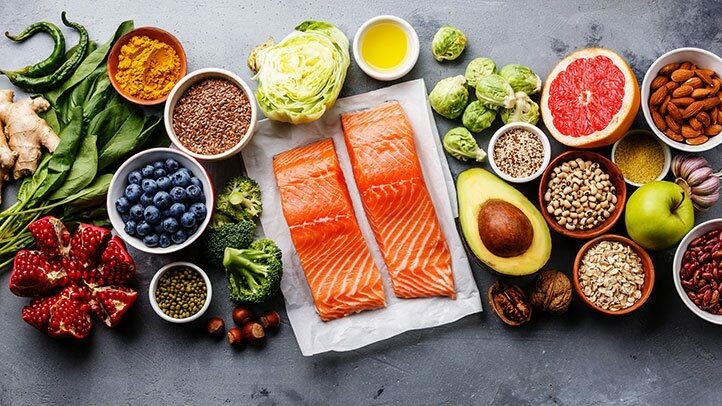
Hormones are chemical messengers that play a crucial role in regulating various physiological processes in the body, including growth, metabolism, reproduction, and mood. An imbalance in hormones can lead to various health issues, ranging from fatigue and weight gain to more serious conditions like diabetes and thyroid disorders. Recently, antioxidants have garnered attention for their potential to support hormonal balance and overall health. This blog explores how hormones function and the ways in which antioxidants can contribute to hormonal health.
The Role of Hormones
Hormones are produced by endocrine glands, including the pituitary, thyroid, adrenal glands, and pancreas. They travel through the bloodstream to tissues and organs, where they exert their effects. Some key hormones and their functions include:
1. **Insulin**: Regulates blood sugar levels.
2. **Thyroid hormones (T3 and T4)**: Control metabolism and energy production.
3. **Estrogen and Progesterone**: Regulate the menstrual cycle and reproductive health.
4. **Cortisol**: Manages stress response and immune function.
5. **Testosterone**: Influences muscle mass, bone density, and sex drive.
The Role of Hormones
Hormones are produced by endocrine glands, including the pituitary, thyroid, adrenal glands, and pancreas. They travel through the bloodstream to tissues and organs, where they exert their effects. Some key hormones and their functions include:
1. **Insulin**: Regulates blood sugar levels.
2. **Thyroid hormones (T3 and T4)**: Control metabolism and energy production.
3. **Estrogen and Progesterone**: Regulate the menstrual cycle and reproductive health.
4. **Cortisol**: Manages stress response and immune function.
5. **Testosterone**: Influences muscle mass, bone density, and sex drive.
Hormonal Imbalance and Its Effects
When hormone levels are too high or too low, it can disrupt normal bodily functions. Common symptoms of hormonal imbalance include:
- Fatigue
- Weight gain or loss
- Mood swings
- Sleep disturbances
- Reduced libido
- Irregular menstrual cycles
Factors contributing to hormonal imbalances include stress, poor diet, lack of exercise, and exposure to toxins.
The Power of Antioxidants
Antioxidants are compounds that protect the body from oxidative stress by neutralizing free radicals—unstable molecules that can damage cells and contribute to aging and diseases. Common antioxidants include vitamins C and E, selenium, and flavonoids found in various fruits, vegetables, nuts, and seeds.
How Antioxidants Support Hormonal Health
1. **Reducing Oxidative Stress**: By neutralizing free radicals, antioxidants help protect endocrine glands from damage, ensuring they function optimally and produce hormones in the right amounts.
2. **Supporting Thyroid Health**: Selenium, an antioxidant found in nuts, seeds, and seafood, is crucial for the production and regulation of thyroid hormones. It helps convert thyroxine (T4) into the more active triiodothyronine (T3).
3. **Balancing Cortisol Levels**: Chronic stress can lead to elevated cortisol levels, which negatively impact overall health. Antioxidants like vitamin C support adrenal gland function and help regulate cortisol production, promoting a balanced stress response.
4. **Enhancing Insulin Sensitivity**: Antioxidants such as alpha-lipoic acid (ALA) and vitamin E improve insulin sensitivity, which helps regulate blood sugar levels and prevents conditions like diabetes.
5. **Protecting Reproductive Health**: Antioxidants like vitamin E and coenzyme Q10 (CoQ10) support reproductive health by reducing oxidative stress in reproductive tissues. This is particularly beneficial for maintaining healthy levels of estrogen and progesterone.
Incorporating Antioxidants into Your Diet
To support hormonal health, it’s important to include a variety of antioxidant-rich foods in your diet. Some excellent sources of antioxidants include:
- **Berries**: Blueberries, strawberries, and raspberries are rich in vitamins C and E.
- **Nuts and Seeds**: Almonds, walnuts, and sunflower seeds provide selenium and vitamin E.
- **Leafy Greens**: Spinach, kale, and Swiss chard are packed with vitamins A and C.
- **Fruits**: Oranges, kiwi, and papaya offer a good dose of vitamin C.
- **Vegetables**: Bell peppers, broccoli, and carrots are excellent sources of various antioxidants.
- **Green Tea**: Rich in polyphenols, green tea is a powerful antioxidant beverage.
Conclusion
Hormonal balance is essential for maintaining overall health and well-being. By understanding the role of hormones and incorporating antioxidant-rich foods into your diet, you can support your endocrine system and promote optimal hormonal health. Regular exercise, adequate sleep, and stress management are also vital components of a holistic approach to maintaining hormonal balance.
---
By focusing on these lifestyle changes and dietary adjustments, you can harness the power of antioxidants to support your hormonal health and overall well-being.
When hormone levels are too high or too low, it can disrupt normal bodily functions. Common symptoms of hormonal imbalance include:
- Fatigue
- Weight gain or loss
- Mood swings
- Sleep disturbances
- Reduced libido
- Irregular menstrual cycles
Factors contributing to hormonal imbalances include stress, poor diet, lack of exercise, and exposure to toxins.
The Power of Antioxidants
Antioxidants are compounds that protect the body from oxidative stress by neutralizing free radicals—unstable molecules that can damage cells and contribute to aging and diseases. Common antioxidants include vitamins C and E, selenium, and flavonoids found in various fruits, vegetables, nuts, and seeds.
How Antioxidants Support Hormonal Health
1. **Reducing Oxidative Stress**: By neutralizing free radicals, antioxidants help protect endocrine glands from damage, ensuring they function optimally and produce hormones in the right amounts.
2. **Supporting Thyroid Health**: Selenium, an antioxidant found in nuts, seeds, and seafood, is crucial for the production and regulation of thyroid hormones. It helps convert thyroxine (T4) into the more active triiodothyronine (T3).
3. **Balancing Cortisol Levels**: Chronic stress can lead to elevated cortisol levels, which negatively impact overall health. Antioxidants like vitamin C support adrenal gland function and help regulate cortisol production, promoting a balanced stress response.
4. **Enhancing Insulin Sensitivity**: Antioxidants such as alpha-lipoic acid (ALA) and vitamin E improve insulin sensitivity, which helps regulate blood sugar levels and prevents conditions like diabetes.
5. **Protecting Reproductive Health**: Antioxidants like vitamin E and coenzyme Q10 (CoQ10) support reproductive health by reducing oxidative stress in reproductive tissues. This is particularly beneficial for maintaining healthy levels of estrogen and progesterone.
Incorporating Antioxidants into Your Diet
To support hormonal health, it’s important to include a variety of antioxidant-rich foods in your diet. Some excellent sources of antioxidants include:
- **Berries**: Blueberries, strawberries, and raspberries are rich in vitamins C and E.
- **Nuts and Seeds**: Almonds, walnuts, and sunflower seeds provide selenium and vitamin E.
- **Leafy Greens**: Spinach, kale, and Swiss chard are packed with vitamins A and C.
- **Fruits**: Oranges, kiwi, and papaya offer a good dose of vitamin C.
- **Vegetables**: Bell peppers, broccoli, and carrots are excellent sources of various antioxidants.
- **Green Tea**: Rich in polyphenols, green tea is a powerful antioxidant beverage.
Conclusion
Hormonal balance is essential for maintaining overall health and well-being. By understanding the role of hormones and incorporating antioxidant-rich foods into your diet, you can support your endocrine system and promote optimal hormonal health. Regular exercise, adequate sleep, and stress management are also vital components of a holistic approach to maintaining hormonal balance.
---
By focusing on these lifestyle changes and dietary adjustments, you can harness the power of antioxidants to support your hormonal health and overall well-being.

If you're over 40 and experiencing hormonal imbalance, then it's important that you understand which foods can help, and which can harm. Eating the right things is essential for restoring balance to your hormones and improving your overall health. However, some foods can aggravate your condition and make it worse. In this blog post, we'll discuss a few of the most common culprits you should avoid in order to keep your hormones in check.
Processed Foods
When it comes to eating for hormone balance, processed food should be avoided at all costs. Processed snacks like chips and candy bars are loaded with unhealthy ingredients that throw off the delicate balance of hormones in your body. The same goes for processed meats like hot dogs or lunch meats. Not only do these items contain high levels of salt and sugar, but they also contain preservatives that have been linked to abnormal hormone levels. The key takeaway here is to stick with fresh, unprocessed foods as much as possible.
Dairy Products
Milk products such as cheese and yogurt may be tasty, but they can also be a source of major problems when it comes to hormonal balance. Dairy products contain naturally occurring hormones called estrogens, which can disrupt the delicate balance of hormones in your body. Furthermore, many dairy products are made from cows treated with synthetic hormones like rBGH (recombinant bovine growth hormone), which can further throw off your natural hormone levels.
Refined Sugar
Refined sugar is one of the worst offenders when it comes to disrupting hormonal balance in women over 40. Refined sugar causes a spike in insulin levels in the body, leading to an increase in fat storage around the midsection—which is often associated with hormonal imbalance issues such as PCOS (polycystic ovarian syndrome). To add insult to injury, refined sugar also promotes inflammation and oxidative stress throughout the body—both of which are linked to higher levels of estrogen production.
Conclusion:
Hormonal imbalances can cause a wide range of unpleasant symptoms including weight gain, low energy levels, mood swings, headaches, fatigue and more. Fortunately, there are ways you can help restore balance back into your hormones by avoiding certain foods like processed snacks, dairy products and refined sugars . By making simple changes to your diet—such as limiting processed foods and focusing on whole foods instead—you'll be taking an important step towards restoring harmony back into your hormones once again!

For years we accepted my husband, Dan's asthma diagnosis as a lifetime illness that would be managed by medications. We never thought asthma and COPD was something that could be improved or irradiated.
In fact, in 2007, Dan suffered a severe asthma attack that landed him in intensive care for a week! The follow ups with pulmonologists after his stint in ICU, were also daunting experiences. He was in addition to the label of asthmatic, Dan was now also suffering from COPD.
What? Dan was only 32 years old! What is his future going to look like? Will he eventually succumb to these diseases? How did this escalate so quickly?
In 2017 Dan and I watched the movie "The Magic Pill" on Netflix.
It was totally up my natural wellness alley so I was excited to sit down and learn. I did not expect to ball my eyes out!!!

The stories in this documentary are so powerful! Each person in this film suffered from a different disease, but weren't improving. Each were put on a diet where they eliminated processed foods, and ate organic, whole foods, while abstaining from gluten, dairy and sugar.
For Dan and I, the lightbulb turned on.
However, not relating to Dan's Asthma, it was our youngest daughter who's language delay was pretty severe.
There is a little girl in the movie who suffered from autism, and she was completely non verbal. After 10 weeks of eating organic whole foods and eliminating gluten, dairy and sugar from her diet, she began to speak!
I was in tears watching her transformation and Dan and I decided, right then, we would immediately begin eating this way in our home.
It was incredible how quickly the clouds lifted in Harper's brain. You see, brain function begins in the gut. Crazy right?

All four of us began to eat whole foods, and stayed away from sugar, gluten and dairy. We knew if we wanted to girls to eat properly, that we would also need to adopt this way of eating.
It was pretty challenging until we developed a routine, but soon it became easier and easier.
We also noticed our oldest daughter, Avery, who has symptoms of ADD, was also doing better!
It wasn't until a year later and a half later that we noticed Dan has stopped using his asthma inhaler. This is an accumulative result using, essential oils, dietary supplements, eliminating toxins in our home, AND DIET!
We knew we were onto something, a sure fire system to help others achieve better respiratory health!
If you or someone you love is suffering, we want to help! We have a community of others, just like you, who are embracing natural ways to improve respiratory health. We share up-to-date resources, to help you navigate the sometimes tricky waters, in learning what foods, products and nutrionals are helpful and safe, and which are not.
We are sharing our experiences with you. Please be sure to consult your doctor.
The information in this video is not intended to diagnose, treat, cure, or prevent any disease or illness.
xoxo Liz
Found this information helpful? Then you you will LOVE my 3 step formula to improve lung health! Check it out right here!


